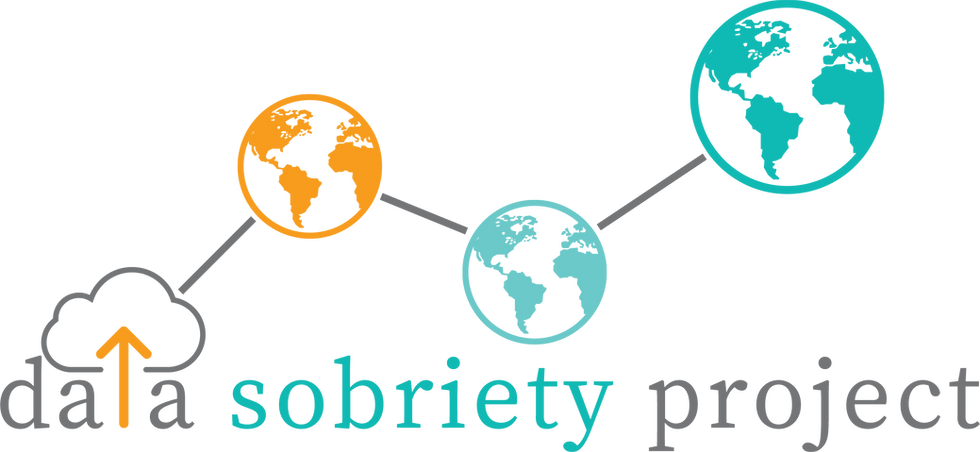Data Sobriety
The Urgent Need for Responsible Data Policies and D-Corp Certification Among Content Creators
In today's digital landscape, content is king. Content creators and marketers wield significant influence over public opinion and consumer behavior. However, the ethical considerations surrounding data collection, storage, and usage are often overlooked. As we push for more responsible data practices, the introduction of a new certification—D Corp (D for Data)—can ensure ethical data management among content creators, aligning with the growing demand for transparency and sustainability.


Awareness
The Environmental Impact of Data Usage
While storytelling remains paramount, the environmental impact of data usage cannot be ignored. Every click, view, and interaction generates data that must be stored and processed, often in energy-intensive data centers. According to a report by the International Energy Agency, data centers accounted for approximately 1% of global electricity demand in 2020. As digital activities increase, this figure is expected to rise significantly.
Data centers require substantial energy for cooling systems to prevent overheating. A study by Nature Climate Change estimated that data centers could consume as much as 8% of the world's electricity by 2030 if current trends continue. This projection underscores the urgency for implementing sustainable data practices.
The Need for Responsible Data Policies
Responsible data policies are essential for mitigating the environmental impact of data usage. These policies should focus on minimizing data collection, optimizing data storage, and ensuring energy-efficient data processing. By adopting these measures, content creators can significantly reduce their carbon footprint.

01
Minimize Data Collection
Only collect data that is necessary for achieving specific business objectives. Avoid gathering excessive data that provides little value but adds to the storage and processing burden.

02
Optimize Data Storage
Implement data retention policies that periodically purge outdated or redundant data. Use efficient data compression techniques to reduce storage space.


03
Energy-Efficient Data Processing
Utilize energy-efficient servers and adopt green data center practices. Implementing renewable energy sources for powering data centers can further reduce the environmental impact.

the pledge
Introducing the D Corp Certification
To further encourage responsible data practices, we propose the establishment of a certified D Corp designation. D Corps (D for Data) would be organizations committed to ethical data practices, transparency, and sustainability. This certification would serve as a mark of trust and responsibility, signaling to consumers that a company values their privacy and the environment.
five commitments & facts
01
Criteria for D-Corp Certification
Data Privacy and Security
Implement robust data privacy policies that protect user information. Ensure compliance with data protection regulations such as GDPR and CCPA.
Transparency
Maintain transparency about data collection and usage practices. Provide clear and accessible information to consumers about how their data is used.
Sustainability
Adopt environmentally friendly practices in data management. This includes using renewable energy sources, optimizing data storage, and minimizing unnecessary data collection.
Ethical Data Usage
Commit to using data ethically, avoiding practices that exploit or harm individuals. This includes refraining from selling personal data without explicit consent.
02
The Business Case for D-Corp Certification
Becoming a certified D Corp offers numerous benefits for content creators and businesses alike:
Enhanced Reputation
In an era where consumers are increasingly concerned about privacy and sustainability, being a D Corp can enhance a company's reputation. It demonstrates a commitment to ethical practices and corporate responsibility.
Consumer Trust
Transparency and ethical data practices build trust with consumers. A D Corp certification reassures customers that their data is handled responsibly, fostering loyalty and long-term relationships.
Competitive Advantage
As data privacy regulations become stricter, companies that proactively adopt responsible data practices will have a competitive edge. D Corps are better prepared to comply with evolving regulations, avoiding potential fines and reputational damage.
Environmental Impact
By implementing sustainable data practices, D Corps contribute to reducing the environmental impact of the digital economy. This aligns with the growing global emphasis on sustainability and corporate social responsibility.
03
Steps to Become a Certified D-Corp
Assessment
Conduct a comprehensive assessment of current data practices, identifying areas for improvement in privacy, transparency, and sustainability.
Implementation
Develop and implement policies and procedures that align with D-Corp certification criteria. This may involve upgrading data infrastructure, training staff, and revising data collection practices.
Certification
Apply for D-Corp certification through an accredited body. This process includes a thorough review of the company's data practices and sustainability efforts.
Continuous Improvement
Maintain D-Corp certification through ongoing commitment to responsible data practices. Regularly review and update policies to ensure continued compliance and improvement.
04
The Role of Content Creators
Content creators play a pivotal role in shaping public discourse and consumer behavior. By adopting responsible data practices and striving for D Corp certification, they can lead by example and inspire other industries to follow suit. The integration of ethical data practices into content creation not only enhances the quality and trustworthiness of content but also contributes to a sustainable and equitable digital ecosystem.
05
The Future of Content Creation
The future of content creation lies in the balance between innovation and responsibility. As technology continues to evolve, content creators must adapt by embracing new storytelling techniques and ethical data practices. Virtual reality (VR) and augmented reality (AR) are prime examples of how technology can enhance storytelling. Brands like The New York Times and Nike have already begun experimenting with these mediums, creating immersive experiences that engage audiences on a deeper level.
For example, The New York Times’ VR project allows viewers to experience news stories in a profoundly immersive way, providing a sense of presence and empathy that traditional media cannot match. Nike's use of AR to let customers visualize products in real-world settings is another innovative approach that enhances the consumer experience while maintaining ethical data practices.
.png)









